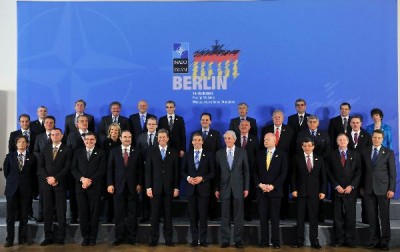BERLIN, April 15 (Xinhua) — Two days of NATO foreign minister meeting in Berlin ended up with mixed outcomes on Friday, combined with vows of unity and signs of division over scope of the alliance military campaign in Libya.
In press conferences during the meeting, NATO Secretary General Anders Fogh Rasmussen continually restated that the NATO is strictly implementing the UN Security Council Resolution 1973 ” both in letter and in spirit”, and taking the responsibility of protecting civilians in Libya from attacks with “all necessary measures”, just as the resolution asked for.
He stressed that the NATO has no intention of interfering with Libyan people’s political process, and the future of the violence- torn North African country will be in hands of its own people.

Participants of the NATO Foreign Minister meeting pose for the official portrait during the second day of NATO Foreign Ministers meeting in Berlin, Germany(Courtesy: Xinhua)
However, the alliance set a clear condition on this no interfering — the departure of current Libyan leader Muammar Gaddafi. “NATO is absolutely determined to continue its operation for as long as there is a threat against Libyan civilians and it is impossible to imagine that threat disappear with Gaddafi in power,” Rasmussen said in the closing press conference.
On Thursday, his words looked less straightforward: NATO ” endorsed” the outcome of the first meeting of the Contact Group, which called for Gaddafi to leave power.
However, the position was greatly strengthened by an article published Friday in The International Herald Tribune and other two mainstream newspapers. The authors represented three prominent members of NATO — U.S. President Barack Obama, British Prime Minister David Cameron and French President Nicolas Sarkozy.
“So long as Gaddafi is in power, NATO must maintain their operations so that civilians remain protected and the pressure on the regime builds,” they vowed, adding that their countries ” have been united from the start” in responding to the Libyan crisis.
In a joint statement, NATO foreign ministers made clear three objectives of its military operation in Libya: the end to all attacks and threat of attacks against civilians, the withdrawal of all Gaddafi’s forces to bases, and an immediate humanitarian access.
Goals are clarified within the alliance, but the Berlin talks still failed to offer a clear answer to how to achieve them, as rifts remained among the powers with different considerations of interests.
Only six out of NATO’s 28 members are conducting air strikes in Libya as the United States has moved back to a supporting role late March. Many countries, such as Italy, have put restrictions on the use of their planes.
Calls for more contribution from allies were repeatedly heard during the Berlin session, and Rasmussen told reporters that the alliance is in need of several precision fight aircraft and sophisticated equipment at the moment.
He said Gaddafi’ forces has changed tactics and hidden heavy arms in highly-populated areas. To avoid possible civilian casualties, NATO has to make precision attacks.
Although Rasmussen said he was confident that the alliance would “step up to the plate,” the NATO chief did not announce any specific pledges or promises during the two-day meeting, simply saying that he “heard indications that gave me hope.”
Rasmussen said in several occasions that the Berlin meeting has “a very positive discussion and a clear expression of unity of purpose and resolve.” However, even before the meeting, signs of discord have emerged as France and Britain impatiently pressed their allies to make more robust contribution for the ongoing mission in Libya, where three weeks of air strikes failed to help the rebels gain the upper hand in the battle field against government troops.
A French official said earlier that Italy, Spain, the Netherlands and Sweden should do more for the joint mission. But Spain government responded Thursday that it had no plan to take part in any air strikes.
Another vital player, the United States also did not say if it would send more jets in Berlin. U.S. Secretary of State Hillary Clinton stressed that the NATO members are “sharing the same goal” and “contributing in many ways to see that goal realized”, avoiding discussion on new pledges and downplaying divisions within the alliance.
“As our mission continues, maintaining our resolve and unity only grows more important,” she added. Washington handed over the control and command to NATO on March 31, but it still assumed one third of flying missions.
On the first meeting of the Contact Group on Libya this week in Doha, countries discussed on whether the international community could provide the rebel army with arms for counter attack government troops or for self defense.
NATO members differ on this issue. Italy was in favor of the suggestion, but collected few positive response. As NATO’s mission should be in accordance with UN Security Council Resolution 1973, which request an arms embargo to Libya, sending weapons to rebels would violate the rules of the resolution.
“As regards to arms, we have been mandated by the UN Security Council to enforce an arms embargo and we will do so in strict conformity,” Rasmussen said, adding that he received no request of amending the resolution in the meeting.
Analysts said that in coming months, NATO’s resolve and coordination capability would be put to serious test as the two conflicting sides in Libya came into a seesaw battle, with Qaddafi’ s force controlling the west and rebels the east.
NATO has apparently been aware of that. Answering questions of German magazine Spiegel, Rasmussen said that “the worst outcome would be a military stalemate or a de facto partition of Libyan society, in which Libya would become a failed state and a breeding ground for terrorist groups — and that so close to Europe’s borders.”






















